 |
Ecumenism
Part II: Why Catholics must avoid all interfaith meetings
and ecumenical events
Modern Ecumenism Condemned by Sacred Scripture
Bishop George Hay
In Part I, the great Catholic apologist Bishop George Hay (1729-1811) showed the three general commands from Scripture that forbid all religious intermingling between Catholics and those of false religions. Here, he continues his teaching, demonstrating that Scripture provides strong reasons to be obeyed. Texts taken from The Sincere Christian, Dublin: James Duffey and Son, pp. 474 -533 - published in Catholic Family News, May 1998.
Laws of God and reasons forbidding communication with false religions
Q. What are the particular laws on this subject?
In the three general commands mentioned in Part I, God Almighty speaks, by the mouth of His holy Apostle, as Lord and Master, and lays His orders upon us absolutely. In what follows, He unites the merciful Savior to the Sovereign; and while He no less strictly commands us to avoid all religious communication with those who are separated from His Holy Faith and Church, He at the same time condescends to engage our obedience by showing us the strongest reasons for it.
1. Beware of false prophets
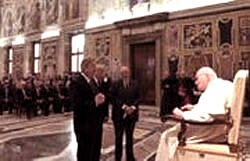
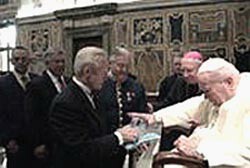
On January 18, 2005, John Paul II being blessed by 160 rabbis at the Vatican |
"Beware of false prophets", says our blessed Master, "who come to you in the clothing of sheep, but inwardly they are ravening wolves" (Mat. 7:5). Here Jesus Christ commands His followers to "beware of false prophets" - that is, to flee from them, to be on their guard against them; and He adds this powerful motive, "lest ye be seduced and ruined by them." For, whatever appearance of godliness they may put on, though they come to you in the clothing of sheep, yet within they are ravenous wolves, and seek only to slay and to destroy.
To the same purpose He says in another place, "Take heed that no man seduce you; for many will come in My name, saying, I am Christ, and they will seduce many." "And many false prophets shall arise and seduce many" (Matt 24:4, 2). Here He foretells the cunning of false teachers, and the danger of being seduced by them, and commands us to take care of ourselves, that such be not our fate.
But how shall we escape from them? He afterwards tells us how: Do not believe them, have nothing to do with them, have no communication, with them. "Then", He says, "if any man shall say, to you, Lo, here is Christ, or there, do not believe him. For there shall arise false Christs and false prophets, and shall show great signs and wonders, insomuch as to deceive even the elect. Behold. I have told it you beforehand. If therefore, they shall say to you, Behold he is in the desert, go ye not out; behold he is in the closet, believe it not" (Mat. 24:23).
Can there be a more powerful reason to enforce the observance of His command, or a stronger motive to induce His followers to have no religious communication with such false teachers? Many will be certainly seduced by them; and so will you, if you expose yourself to the danger.
2. All false religions are separated from the Kingdom of Christ
St. Peter, considering the great mercy bestowed upon us by the grace of our vocation to the true faith of Christ, says, that it is our duty to "declare the praises and virtues of Him who hath called us out of darkness into His admirable light" (1 Pet. 2:9). St. Paul also exhorts us to "give thanks to God the Father, who hath made us worthy to be partakers of the lot of the saints in light, who hath delivered us from the power of darkness, and hath translated us into the kingdom of His beloved Son" (Col 1:12.)
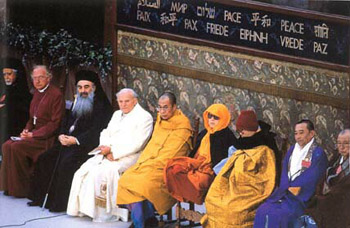
At Assisi 1986, John Paul II prays with false religions |
From this it is manifest that as the true Faith of Jesus Christ is the only light that conducts to salvation, and that it is only in His Kingdom - that is, in His Church - where that heavenly light is to be found, so all false religions are darkness; and that to be separated from the Kingdom of Christ is to be in darkness as to the great affair of eternity.
And indeed, what greater or more miserable darkness can a soul be in than to be led away by seducing spirits, and "departing from the faith of Christ, give heed to the doctrine of devils" (1 Tim. 4:1.) St. Paul, deploring the state of such souls, says that they "have their understandings darkened, being alienated from the life of God, through the ignorance: that is in them, because of the blindness of their hearts" (Eph. 4:18).
On this account the same holy Apostle exhorts us in the most pressing manner to take care not to be seduced from the light of our holy Faith by the vain words and seducing speeches of false teachers, by which we would certainly incur the anger of God. To prevent so great a misery, He not only exhorts us to walk as children of the light in the practice of all holy virtues, but expressly commands us to avoid all communication in religion with those who walk in the darkness of error: "Let no man deceive you with vain words, for because of these things cometh the anger of God upon the children of unbelief; be ye not, therefore, partakers with them. For ye were theretofore darkness; but now light in the Lord; walk ye as the children of the light ... and have no fellowship with the unfruitful works of darkness" (Eph. 5:6).
Here, then, we have an express command, not only not to partake with the unfruitful works of darkness - that is, not to join in any false religion, or partake of its rites or sacraments - but also, not to have any fellowship with its professors, not to be present at their meetings or sermons, or any other of their religious offices, lest we be deceived by them, and incur the anger of the Almighty, provoke Him to withdraw His assistance from us, and leave us to ourselves, in punishment of our disobedience.
3. The signs to discover heretics
St. Paul, full of zeal for the good of souls, and solicitous to preserve us from all danger of losing our holy Faith, the groundwork of our salvation, renews the same command in his Epistle to the Romans, by way of entreaty, beseeching us to avoid all such communication with those of a false religion. He also shows us by what sign we should discover them, and points out the source of our danger from them: "Now I beseech you, brethren, to mark them who cause dissensions and offenses contrary to the doctrine which you have learned, and to avoid them; for they that are such serve not Our Lord Christ, but their own belly, and by pleasing speeches and good words seduce the hearts of the innocent" (Rom 16:17).
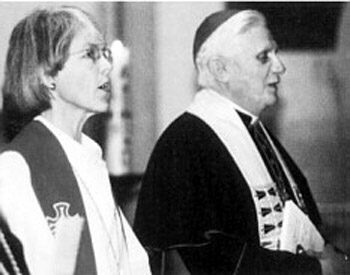
Cardinal Ratzinger praying along with a Lutheran ministress, in a Protestant temple |
See here are those whom we are to avoid: "those who cause dissensions contrary to the ancient doctrine"; that is, all those who, hating, left the true Faith and doctrine which they had learned and which has been handed down to us from the beginning by the Church of Christ, follow strange doctrines, and make divisions and dissensions in the Christian world.
And why are we to avoid them? Because they are not servants of Christ, but slaves to their own belly, whose hearts are placed upon the enjoyments of this world, and who, by "pleasing speeches and good words, seduce the hearts of the innocent" - that is, do not bring good reasons or solid arguments to seduce people to their evil ways, so as to convince the understanding, for that is impossible.
But rather they practice upon their hearts and passions, relaxing the laws of the Gospel, granting liberties to the inclinations of flesh and blood, laying aside the sacred rules of mortification of the passions and of self-denial, promising worldly wealth, and ease, and honors, and, by pleasing speeches of this kind, seducing the heart, and engaging people to their ways.
4. Avoid all communication with false teachers
The same argument and command the Apostle repeats in his Epistle to his beloved disciple Timothy, where he gives a sad picture, indeed, of all false teachers, telling us that they put on an outward show of piety the better to deceive: "having an appearance, indeed, of godliness, but denying the power thereof." Then he immediately gives this command: "Now these avoid: for of this sort are they that creep into houses, and lead captive silly women laden with sins, who are led away with divers desires."
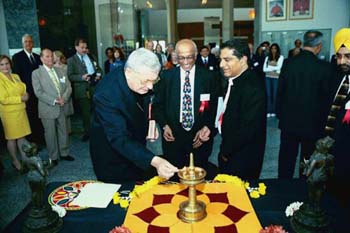
Papal nuncio to the US, Pietro Sambi, lights a lamp to Hindu deities at a inter-faith meeting at the JPII cultural center |
And he adds this sign by which they may be known, that, not having the true Faith of Christ, and being out of His Holy Church - the only sure rule for knowing the truth - they are never settled, but are always altering and changing their opinions, "ever learning, and never attaining to the knowledge of the truth," because, as he adds, "they resist the truth, being corrupted in their mind, and reprobate concerning the Faith" (2 Tim. 3:5).
Here it is to be observed that, though the Apostle says that silly weak people, and especially women, are most apt to be deceived by such false teachers, yet he gives the command of avoiding all communication with them in their evil ways, to all without exception, even to Timothy himself; for the Epistle is directed particularly to him. It is to him he says, as well as to all others, "Now these avoid," though Timothy was a pastor of the church, and fully instructed by the Apostle himself in all the truths of religion. This is because, besides the danger of seduction, which none can escape who voluntarily expose themselves to it, all such communication is evil in itself, and therefore to be avoided by all, and especially by pastors, whose example would be more prejudicial to others.
5. The prescript applies to both the clergy and the people
Lastly, the beloved disciple St. John renews the same command in the strongest terms, and adds another reason, which regards all without exception, and especially those who are best instructed in their duty: "Look to yourselves that you lose not the things that you have wrought, but that you may receive a full reward. Whosoever revolts, and continues not in the doctrine of Christ, has not God. He that continues in the doctrine, the same has both the Father and the Son. If any man come to you and bring not this doctrine, receive him not into your house, nor say to him, God speed you: for he that says to him, God speed you, communicates with his wicked works" (2 John, 8).
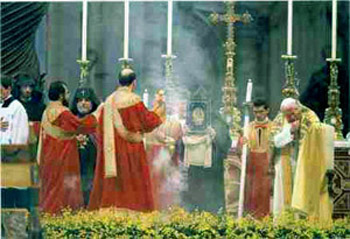
JPII and heretical patriarch Karekin II, fourth from left, celebrate liturgy together at St. Peter’s Basilica - November 2000. |
Here, then, it is manifest, that all fellowship with those who have not the doctrine of Jesus Christ, which is "a communication in their evil works" - that is, in their false tenets, or worship, or in any act of religion - is strictly forbidden, under pain of losing the "things we have wrought, the reward of our labors, the salvation of our souls." And if this holy Apostle declares that the very saying of God speed to such people is a communication with their wicked works, what would he have said of going to their places of worship, of hearing their sermons, joining in their prayers, or the like?
From this passage the learned translators of the Rheims New Testament justly observe in their note, "That, in matters of religion, in praying, hearing their sermons, presence at their service, partaking of their sacraments, and all other communicating with them in spiritual things, it is a great and damnable sin to deal with them." And if this be the case with all in general, how much more with those who are well-instructed and better versed in their religion than others? For their doing any of these things must be a much greater crime than should ignorant people do them, because they know their duty better.
The Church's constant teaching
Q. These laws are very clear and strong; but has the Catholic Church always observed and enforced the observance of them?
The spirit of Christ, which dictated the Holy Scriptures, and the spirit which animates and guides the Church of Christ, and teaches her all truth, is the same. Therefore, in all ages her conduct on this point has been uniformly the same as what the Holy Scripture teaches. She has constantly forbidden her children to hold any communication, in religious matters, with those who are separated from her communion; and this she has sometimes done under the most severe penalties.
In the apostolical canons, which are of very ancient standing and for the most part handed down from the apostolical age, it is thus decreed: "If any bishop, or priest, or deacon, shall join in prayers with heretics, let him be suspended from Communion" (Can. 44).
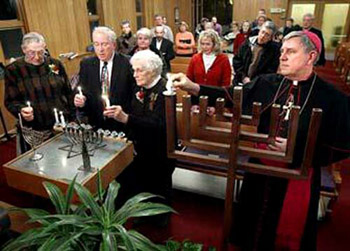
Catholic Bishop Listecki lights a menorah in the LaCrosse synagogue, Wisconsin, in December 2007
|
Also, "If any clergyman or laic shall go into the synagogue of the Jews, or the meetings of heretics, to join in prayer with them, let him be deposed, and deprived of communion" (Can. 63) .
So also, in one of her most respected councils, held in the year 398, at which the great St. Augustine was present, she speaks thus: "None must either pray or sing psalms with heretics; and whosoever shall communicate with those who are cut off from the Communion of the Church, whether clergyman or laic, let him be excommunicated" (Coun. Carth. iv. 72 and 73) .
The same is her language in all ages; and in this she shows herself to be the true mother, who will not suffer her children to be divided. She knows her heavenly spouse has declared that "no man can serve two masters: we cannot serve God and Mammon"; and therefore she must either have them to be hers entirely, or she cannot acknowledge them as such. She knows His holy Apostle has protested that there can be no "participation, no fellowship, no concord, no pact, no agreement between the faithful and the unbeliever"; and therefore she never can allow any of her faithful children to have any religious communication with those of a false religion and corrupted Faith.

Posted June 16, 2008

Related Topics of Interest
 Modern Ecumenism Condemned by Sacred Scripture - Part I Modern Ecumenism Condemned by Sacred Scripture - Part I
 Ecumenical Chapel at St. Paul Outside the Walls Ecumenical Chapel at St. Paul Outside the Walls
 Pictures of a Desecration at Fatima Pictures of a Desecration at Fatima
 Please Don't Call Protestants Christians Please Don't Call Protestants Christians
 JPII Kisses the Hand of Rowan Williams, Head of the Anglican Sect JPII Kisses the Hand of Rowan Williams, Head of the Anglican Sect
 Praying with Heretics - Where is the Resistance? Praying with Heretics - Where is the Resistance?


|
Ecumenism | Hot Topics | Home | Books | CDs | Search | Contact Us | Donate
 © 2002-
Tradition in Action, Inc. All Rights Reserved
© 2002-
Tradition in Action, Inc. All Rights Reserved
|
 |
|